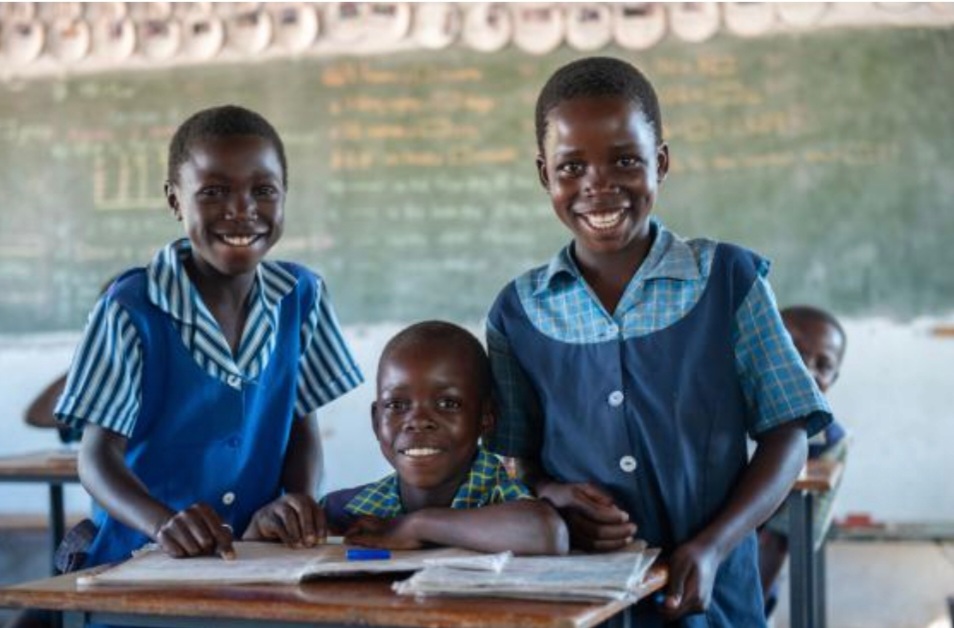BY WILSON MAREYA AND JOHN MOKWETSI
Without the School Improvement Grant (SIG), learners at Nyongolo Primary School in Hwange district would not be celebrating the provision of textbooks, teaching material, classroom furniture, and a good learning environment.
Nyongolo Primary School is a registered rural school located about 340 km from Zimbabwe’s second-biggest city, Bulawayo.
The school is a few metres from the Hwange-Victoria Falls highway and has 5 classrooms and 272 learners (147 females and 125 males).
Hwange District is primarily a mining district.
Large coal deposits are found in the district, and several large coal mines are located there.
Despite being mineral-rich, the locals survive on menial jobs, with most not affording to buy their children basic education needs.
Most learners live within a radius of 10km from the school.
Nyongolo is one of the beneficiaries of the School Improvement Grant (SIG) Regular programme made possible thanks to funding from the United Kingdom’s Foreign Commonwealth and Development Office (FCDO).
The grant aims to support financially constrained schools with resources to meet their minimum functionality standards.
FCDO supports the Ministry of Primary and Secondary Education initiatives towards improving the quality of education for all children, especially the vulnerable and disadvantaged, with UNICEF managing the funds and providing technical support.
The school head, Nokuthula Ndebele, is ecstatic when she speaks of the benefits of SIG: “Textbooks have come as a game changer for our pupils. We used to have acute shortages of textbooks, where the school could only afford one textbook for the whole class.
“For the Ndebele language, the school did not have any textbooks for grades 6 and 7.
“With the funds available to purchase more textbooks and teaching materials, the learners gain motivation and interest in learning as each learner has their textbook for most of the subjects.”
She added that for the Ndebele language in 2022, the school posted impressive Grade 7 results, with 24 out of 34 learners having passed.
“We expect this success to be replicated in all other subjects in 2023. The quality of learning is surely improving.
“Our school had many non-readers when I took over as head in 2021. Now there is a significant improvement.
“With access to textbooks, the reading culture is improving,” Ndebele revealed the positive impact.
For schools like Nyongolo, where several learners were non-readers, SIG has been a critical pillar in supporting foundational literacy.
Ndebele added: “SIG is the most contributor towards the school’s existence; I don’t know what we would have done without SIG.
“The school would probably not exist anymore.
“The levies and fees are too low to support the school.
“With the last grant, we purchased 16 single desks, 18 chairs and 24 textbooks, and our classrooms are now looking the way a classroom should look.”
Most desks and chairs are stacked at the back of the classroom as schools have closed for the third term holiday.
The school’s School Development Association (SDA) chairperson, Joseph Ndlovu, said of the support: “Before the intervention of UNICEF, our school did not have enough textbooks.
“Children sat on combined desks and chairs, which made social distancing impossible during Covid.
“Now a larger proportion of the learners have single desks and chairs. The community is quite happy with the improvements at the school.”
He added that the school and the parents could not afford textbooks and suitable furniture for every learner.
“The school could only afford to buy a single textbook per class for the teacher.
“We are glad for the support we receive from UNICEF and the Ministry (of Primary and Secondary Education).
“Now for most subjects, each learner has their own textbook, and the children are happy”, said Joseph.
The support given to schools has positively impacted schooling in many financially constrained schools in Zimbabwe.
Dreams of a brighter future are being kept alive in these poor communities.
Ndebele spoke of the challenges.
“The challenge is still on subjects like PE and ICT where we have one textbook for the whole class in some classes.
“We also do not have enough classrooms for our learners. If the district approves our application for Complementary Funding, we plan to renovate and complete a classroom unit for ECD.”
In early December, the school applied to the District Education for UNICEF-supported complementary funding to support the school’s infrastructure development.
The school aims to renovate and complete a big classroom unit for ECD and provide an appropriate and enabling learning environment for the infants.
The school head hopes to get support from the School Improvement Grant component of Complementary Funding from the Global Partnership for Education (GPE) – where schools get funding to renovate, rehabilitate or complete existing school structures such as science laboratories, classrooms or hygiene-friendly toilets for the learners. She is also hoping for continued support so the school can purchase suitable furniture for infants and purchase more textbooks for subjects like (Information and Communication Technology (ICT) and Physical Education (PE). – UNICEF Zimbabwe

 Slider3 years ago
Slider3 years ago
 National4 years ago
National4 years ago
 Tourism and Environment4 years ago
Tourism and Environment4 years ago
 Opinion4 years ago
Opinion4 years ago
 Special reports4 years ago
Special reports4 years ago
 National4 years ago
National4 years ago
 National3 years ago
National3 years ago
 National3 years ago
National3 years ago



